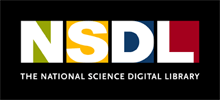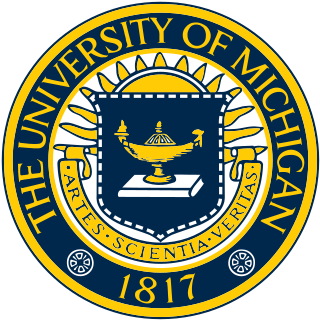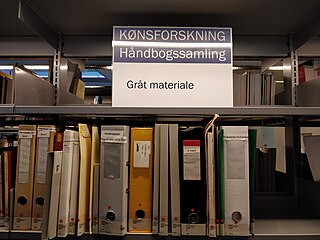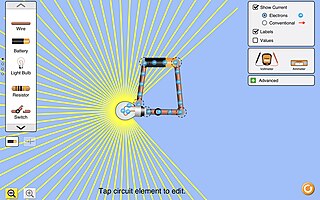Electronic publishing includes the digital publication of e-books, digital magazines, and the development of digital libraries and catalogues. It also includes the editing of books, journals, and magazines to be posted on a screen.

The United States' National Science Digital Library (NSDL) is an open-access online digital library and collaborative network of disciplinary and grade-level focused education providers operated by the Institute for the Study of Knowledge Management in Education. NSDL's mission is to provide quality digital learning collections to the science, technology, engineering, and mathematics (STEM) education community, both formal and informal, institutional and individual. NSDL's collections are refined by a network of STEM educational and disciplinary professionals. Their work is based on user data, disciplinary knowledge, and participation in the evolution of digital resources as major elements of effective STEM learning.

The American Chemical Society (ACS) is a scientific society based in the United States that supports scientific inquiry in the field of chemistry. Founded in 1876 at New York University, the ACS currently has more than 155,000 members at all degree levels and in all fields of chemistry, chemical engineering, and related fields. It is one of the world's largest scientific societies by membership. The ACS is a 501(c)(3) non-profit organization and holds a congressional charter under Title 36 of the United States Code. Its headquarters are located in Washington, D.C., and it has a large concentration of staff in Columbus, Ohio.

The Royal Society of Chemistry (RSC) is a learned society in the United Kingdom with the goal of "advancing the chemical sciences". It was formed in 1980 from the amalgamation of the Chemical Society, the Royal Institute of Chemistry, the Faraday Society, and the Society for Analytical Chemistry with a new Royal Charter and the dual role of learned society and professional body. At its inception, the Society had a combined membership of 34,000 in the UK and a further 8,000 abroad. The headquarters of the Society are at Burlington House, Piccadilly, London. It also has offices in Thomas Graham House in Cambridge where RSC Publishing is based. The Society has offices in the United States, on the campuses of The University of Pennsylvania and Drexel University, at the University City Science Center in Philadelphia, Pennsylvania, in both Beijing and Shanghai, China and in Bangalore, India.

Open educational resources (OER) are teaching, learning, and research materials intentionally created and licensed to be free for the end user to own, share, and in most cases, modify. The term "OER" describes publicly accessible materials and resources for any user to use, re-mix, improve, and redistribute under some licenses. These are designed to reduce accessibility barriers by implementing best practices in teaching and to be adapted for local unique contexts.

The University of Michigan Library is the academic library system of the University of Michigan. The university's 38 constituent and affiliated libraries together make it the second largest research library by number of volumes in the United States.

Grey literature is materials and research produced by organizations outside of the traditional commercial or academic publishing and distribution channels. Common grey literature publication types include reports, working papers, government documents, white papers and evaluations. Organizations that produce grey literature include government departments and agencies, civil society or non-governmental organizations, academic centres and departments, and private companies and consultants.
The California Digital Library (CDL) was founded by the University of California in 1997. Under the leadership of then UC President Richard C. Atkinson, the CDL's original mission was to forge a better system for scholarly information management and improved support for teaching and research. In collaboration with the ten University of California Libraries and other partners, CDL assembled one of the world's largest digital research libraries. CDL facilitates the licensing of online materials and develops shared services used throughout the UC system. Building on the foundations of the Melvyl Catalog, CDL has developed one of the largest online library catalogs in the country and works in partnership with the UC campuses to bring the treasures of California's libraries, museums, and cultural heritage organizations to the world. CDL continues to explore how services such as digital curation, scholarly publishing, archiving and preservation support research throughout the information lifecycle.

Project MUSE, a non-profit collaboration between libraries and publishers, is an online database of peer-reviewed academic journals and electronic books. Project MUSE contains digital humanities and social science content from over 250 university presses and scholarly societies around the world. It is an aggregator of digital versions of academic journals, all of which are free of digital rights management (DRM). It operates as a third-party acquisition service like EBSCO, JSTOR, OverDrive, and ProQuest.
Nature Precedings was an open access electronic preprint repository of scholarly work in the fields of biomedical sciences, chemistry, and earth sciences. It ceased accepting new submissions as of April 3, 2012.
The Electrochemical Society is a learned society based in the United States that supports scientific inquiry in the field of electrochemistry and solid-state science and related technology. The Society membership comprises more than 8,000 scientists and engineers in over 85 countries at all degree levels and in all fields of electrochemistry, solid state science and related technologies. Additional support is provided by institutional members including corporations and laboratories.
Current Contents is a rapid alerting service database from Clarivate Analytics, formerly the Institute for Scientific Information and Thomson Reuters. It is published online and in several different printed subject sections.
A digital library, also called an online library, an internet library, a digital repository, or a digital collection is an online database of digital objects that can include text, still images, audio, video, digital documents, or other digital media formats or a library accessible through the internet. Objects can consist of digitized content like print or photographs, as well as originally produced digital content like word processor files or social media posts. In addition to storing content, digital libraries provide means for organizing, searching, and retrieving the content contained in the collection. Digital libraries can vary immensely in size and scope, and can be maintained by individuals or organizations. The digital content may be stored locally, or accessed remotely via computer networks. These information retrieval systems are able to exchange information with each other through interoperability and sustainability.
Romantic Circles is an academic peer-reviewed website dedicated to the study of Romantic literature and culture, featuring online editions of many texts of the Romantic era, as well as essays devoted to Romantic literature, culture, and theory.
The Alsos Digital Library for Nuclear Issues is a searchable collection of vetted annotations and bibliographic information for resources including books, articles, films, CD-ROMs, and websites pertaining to nuclear topics. Part of the United States' National Science Digital Library (NSDL) and located at Washington and Lee University, the digital library provides a balanced selection of high quality resources across many disciplines to a broad audience including students, scholars, professionals, and the general public. Originally focused on the history of the Manhattan Project, the library has expanded to include the far-reaching consequences of the discovery of atomic energy, including topics such as nuclear power, and nuclear proliferation.

D-Scribe Digital Publishing is an open access electronic publishing program of the University Library System (ULS) of the University of Pittsburgh. It comprises over 100 thematic collections that together contain over 100,000 digital objects. This content, most of which is available through open access, includes both digitized versions of materials from the collections of the University of Pittsburgh and other local institutions as well as original 'born-electronic' content actively contributed by scholars worldwide. D-Scribe includes such items as photographs, maps, books, journal articles, dissertations, government documents, and technical reports, along with over 745 previously out-of-print titles published by the University of Pittsburgh Press. The digital publishing efforts of the University Library System began in 1998 and have won praise for their innovation from the leadership at the Association of Research Libraries and peer institutions.
MERLOT is an online repository and international consortium of institutions of higher education, industry partners, professional organizations and individuals. MERLOT partners and members are devoted to identifying, peer reviewing, organizing and making available existing online learning resources in a range of academic disciplines for use by higher education faculty and students.

PhET Interactive Simulations, a project at the University of Colorado Boulder, is a non-profit open educational resource project that creates and hosts explorable explanations. It was founded in 2002 by Nobel Laureate Carl Wieman. PhET began with Wieman's vision to improve the way science is taught and learned. Their stated mission is "To advance science and math literacy and education worldwide through free interactive simulations."
The WAC Clearinghouse publishes peer-reviewed, open-access journals and books, as well as other professional resources for teachers and instructional materials for students. Writing-across-the-curriculum (WAC) refers to a formal programmatic approach within contemporary secondary and higher education composition studies that promotes the importance of writing in classes outside of composition.

Archaeometry is a peer-reviewed academic journal covering archaeological science, particularly absolute dating methods, artefact studies, quantitative archaeology, remote sensing, conservation science, and environmental archaeology. It is published bimonthly by Wiley-Blackwell, on behalf of the Research Laboratory for Archaeology and the History of Art at the University of Oxford, in association with the Gesellschaft für Naturwissenschaftliche Archäologie Archäometrie and the Society for Archaeological Sciences. Its current editors are A. Mark Pollard, Ina Reiche, Brandi MacDonald, Gilberto Artioli, and Catherine Batt.









